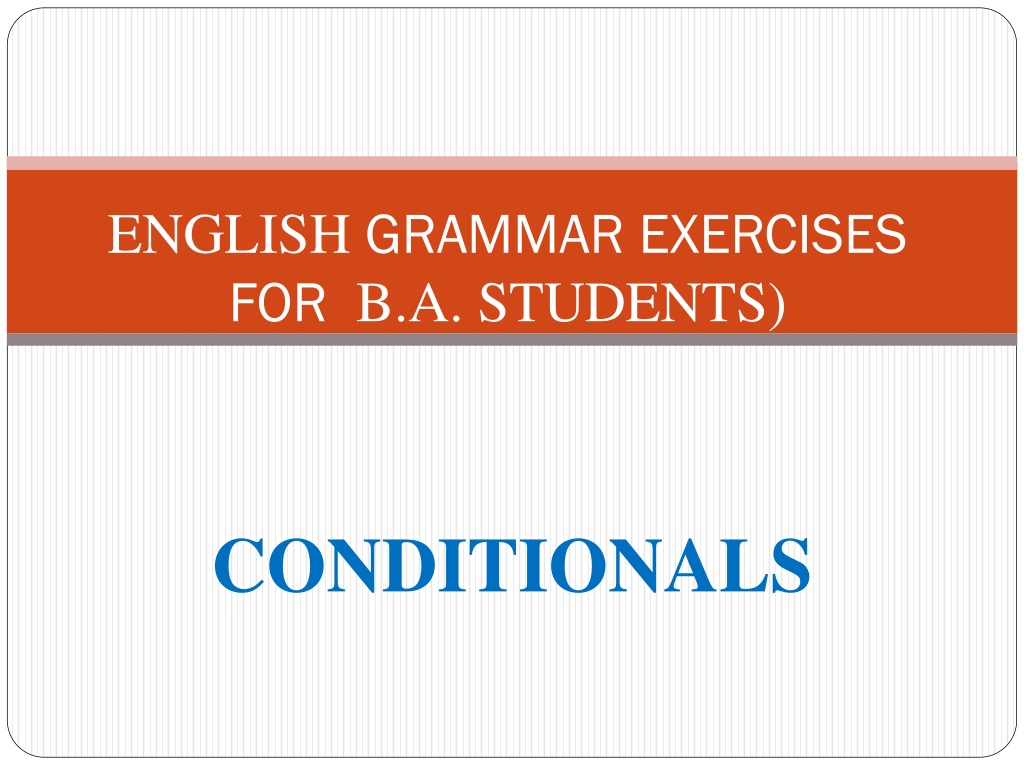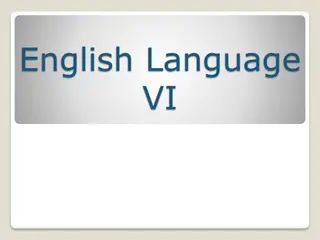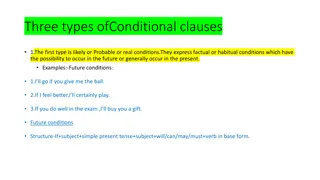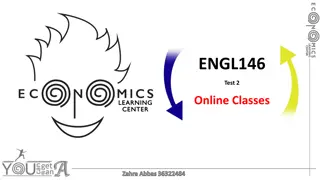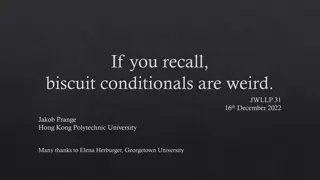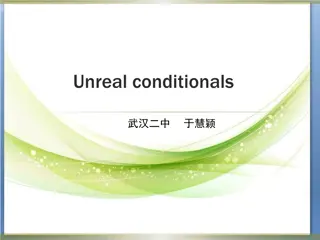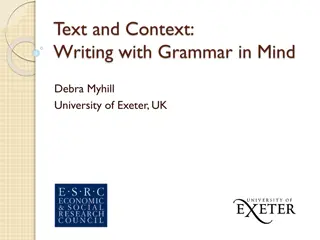Understanding English Grammar Conditionals for B.A. Students
The article explains three types of conditionals - open conditions (First Conditionals), hypothetical conditions (Second Conditionals), and past conditions (Third Conditionals). It discusses how conditional clauses relate to reason clauses and the consequences of real or hypothetical events. Examples are provided to illustrate the different types of conditionals.
Download Presentation

Please find below an Image/Link to download the presentation.
The content on the website is provided AS IS for your information and personal use only. It may not be sold, licensed, or shared on other websites without obtaining consent from the author. Download presentation by click this link. If you encounter any issues during the download, it is possible that the publisher has removed the file from their server.
E N D
Presentation Transcript
ENGLISH GRAMMAR EXERCISES FOR B.A. STUDENTS) CONDITIONALS
Conditionals continued There are three types of conditionals: 1. Open conditions (First Conditionals) 2. Hypothetical conditions (Second Conditionals) 3. past conditions (Third Conditionals) Conditional clauses are related to reason clauses, but they discuss the consequence of something which may are may not be a real event. Notice the difference between: I ll lend peter money because he needs it. [1] I ll lend Peter the money if he needs it. [2] ( I d lend Peter money if he needed it. And, I would have lent Peter money if he had needed it.) The speaker of sentence [2] does not know whether peter needs the money, while the speaker of [1] knows that he does.
Continued A sentence like [2] expresses what we call an OPEN condition, because the truth or falsehood of what the sentence describes is open ,ie unknown. The conditional clause often precede the main clause: If you feel seasick, take one of these pills. If you work hard, you will pass the exam. If the students come to the class, the teacher will take the class. If someone knocks the door, we ll open it. If you come, she ll go with you
Continued HYPOTHETICAL CONDITIONALS: The type of conditional sentence, which expresses an unreal or HYPOTHETICAL condition; ie for this type of sentence the speaker assumes the falsehood or unlikelihood of what he is talking about: I d lend Peter money if he needed it. The speaker s assumption here is but he doesn t need money . As this example shows, the hypothetical meaning is signalled by the use of the hypothetical past tense. (Fact, hypothesis, neutrality: the truth and falsehood of statements in terms of affirmation, denial, negation, etc. can easily be recognised by the context. But there are many circumstances in which the issue of truth or falsehood is ASSUMED rather than directly stated. Compare:
Continued (FACT) I m glad that John has agreed. I wish that John had agreed. (HYPOTHESIS) In [1], the speaker assumes the truth of the statement John has agreed, While in [2] he assumes its falsehood. We will call something assumed to be false HYPOTHETICAL.) Less common indicators of condition are the conjunctions incase, on condition that, provided that, and the preposition in case of : Take these pills, in case you feel ill on the boat. I ll lend you the money on condition that you return it within six months. Provided that they had plenty to eat and drink, the men were happy. So long as they had plenty to eat and drink, the men were happy.
Continued In case specifies a future condition that may or may not arise. On condition that stipulates or lays down a condition to which a person must agree. Provided that and so long as resemble on condition that in having the restrictive implication of if and only if . In that case and then (informal) are sentence adverbials of condition: (A) he may have missed the train. (B) In that case, he would have taken a taxi. He would have taken a taxi, then. Unless expresses a negative condition. Thus we would change the emphasis the earlier sentence by saying: I won t lend peter the money unless he needs it.
Continued Uncertain events and situations In clauses after if, we usually talk about uncertain events and situations: things which may or may not happen, which may or may not be true,etc. As: Ask John if he s staying tonight. ( He may or may not be staying.) If I see Annie I ll give her your love. ( I may or may not see Annie.)
Conditionals continued( EXERCISES) OPEN CONDITIONALS Put the verbs in brackets into correct tenses. Answer: 1. If I see him I shall give him a lift. 2. The table will collapse if you stand on it. 3. If he eats all that he will be ill. 4. If I find your passport I shall telephone you. 5.The police will arrest him if they catch him. 1. If I see him I (give) him a lift. 2. The table will collapse if you (stand) on it. 3. if he (eat) all that he will be ill. 4. If I find your passport I (telephone) you at once. 5. The police (arrest) him if they catch him.
Continued Continued Continued 6. If he reads in bad light he will ruin his eyes. 7. Someone will steal your car if you leave it unlocked. 8. What will happen if my parachute does not open? 9. If he washes my car I ll give him Rs 300. 10 If she needs a radio she can borrow mine. 6. If he (read) in bad light he will ruin his eyes. 7. Someone (steal) your car if you leave it unlocked. 8. What will happen if my parachute (not open)? 9. If he (wash) my car I ll give him Rs 300. 10. If she (need) a radio she can borrow mine.
Continued Continued 11. If you (not go) away I ll send for the police. 12. I ll be very angry if he (make) any more mistakes. 13. If he (be) late we ll go without him. 14. She ll be absolutely furious if she (hear) about this. 15. If you put on the kettle I (make) the tea. Continued 11. If you don t go away I ll send for the police. 12. I ll be very angry if he makes any more mistakes. 13. If he is late we ll go without him. 14. She ll be absolutely furious if she hears about this. 15. if you put on the kettle I ll make the tea.
Continued Continued Continued 16. If you give my dog a bone he (bury) it at once. 17. If we leave the car here it (not be) in anybody s way. 18. He ll be late for the train if he (not start) at once. 19. If you come late they (not let) you in. 20. if he (go) on telling lies nobody will believe a word he says. 16. If you give my dog a bone he will bury it at once. 17. If we leave the car here it ll not be in anybody s way. 18. He ll be late for the train he doesn t start at once. 19. If you come late they will not let you in. 20 If he goes on telling lies no body will believe a word he says.
Second Conditionals or Hypothetical conditionals Put verbs in brackets into the correct tenses: Answer: 1. If I had a typewriter I would type it myself. 2. If I knew his address I d give it to you. 3. He would look a lot better if he shaved more often. 4. If you played for lower stakes you wouldn t lose so much. 5. If he worked more slowly he would not make so many mistakes. 1. If I had a typewriter I (type) it myself. 2. If I (know) his address I d give it to you. 3. He (look) a lot better if he shaved more often. 4. If you (play) for lower stakes you wouldn t lose so much. 5. If he worked more slowly he (not make) so many mistakes.
Continued Answer continued Continued 6. I shouldn t drink that wine if I were you. 7. More tourists would come to this country if it had a better climate. 8. If I were sent to prison would you visit me? 9. If someone gave you a helicopter what would you do with it? 10. I would buy shares in that company if I had some money. 6. I shouldn t drink that wine if I (be) you. 7. More tourists would come to this country if it (have) a better climate. 8. If I were sent to Prison you (visit) me? 9. If someone (give) you a helicopter what would you do with it? 10. I (buy) shares in that company if I had some money.
Continued Continued Continued 11. if he cleaned his windscreen he d be able to see where he was going. 12. If you drove your car into the river would you be able to get out? 13. if you did not belong to a union you couldn t get a job. 14. If I won a big prize in a lottery I d give up my job. 15. what would you do if you found a burglar in your house? 11. If he (clean) his windscreen he d be able to see where he was going. 12. If you drove your car into the river you (be able) to get out? 13. If you (not belong) to a union you couldn t get a job. 14. If I (win) a big prize in a lottery I d give up my job. 15. What you (do) if you found a burglar in your house?
Continued Continued Continued 16. I could tell you what this means if I (know) Greek. 17. If everybody (give) Rs 100/= we would have enough. 18. He might get fat if he (stop) smoking. 19. If he knew that it was dangerous he (not come). 20. If you (see) someone drowning what would you do? 16. I could tell you what this means if I knew Greek. 17. If everybody gave Rs 100/= we would have enough. 18. He might get fat if he stopped smoking. 19. If he knew that it was dangerous he would not come. 20. If you saw someone drowning what would you do?
Third Conditionals or Past Conditionals Put the verbs in brackets into the correct tenses: Answer: 1. If I had known that you were in hospital I would have visited you. 2. If the ground had not been very soft my horse would have won. 3. If you had arrived ten minutes earlier you would have got a seat. 4. you would have seen my garden at its best if you had been here last week. 1. If I had known that you were in hospital I (visit) you. 2. The ground was very soft. But for that, my horse (win). 3. If you (arrive) ten minutes earlier you would have got a seat. 4. You would have seen my garden at its best if you (be) here last week.
Continued Continued Continued 5. If he had not been quick I would have been killed. 6. I shouldn t have believed it if I had not seen it with my own eyes. 7 If he had slipped he would have fallen 500 metres. 8. if he had asked you , would you have accepted? 9. If I had had a map I would have been all right. 5. But for his quickness I (be) killed. 6. I shouldn t have believed it if I (not see) it with my own eyes. 7. If he had slipped he (fall) 500 metres. 8. If he had asked you, you (accept)? 9. If I (have) a map I would have been all right.
Continued Continued 10. I would have offered to help him if I had realized that he was ill. 11. if I had known that you were coming I d have baked a cake. 12. If you had left that wasp alone it would not have stung you. 13. If I had realized what a bad driver you were I wouldn t have come with you. Continued 10. I (offer) to help him if I had realized that he was ill. 11. If I (know) that you were coming I d have baked a cake. 12. If you had left that wasp alone it (not sting) you. 13. If I (realize) what a bad driver you were I wouldn t have come with you.
Continued Continued Continued 14. If I had realized that the traffic lights were red I would have stopped. 15. If there had not been the fog we would have reached our destination ages ago. 16. If you had told me that he never paid his debts I would not have lent him the money. 17. If you had not sneezed he wouldn t have known that we were there. 14. If I had realized that the traffic lights were red I (stop). 15. But for the fog we (reach) our destination ages ago. 16. If you had told me that he never paid his debts I (not lend) him the money. 17. If you (not sneeze) he wouldn t have known that we were there.
Continued Continued Continued 18. If you had put some mustard in the sandwiches they would have tasted better. 19. The hens would not have got into the house if you had shut the door. 20. If he had known that the river was dangerous he would not have tried to swim across it. 18. If you (put) some mustard in the sandwiches they would have tasted better. 19. The hens (not get) into the house if you had shut the door. 20. If he had known that the river was dangerous he (not try) to swim across it.
